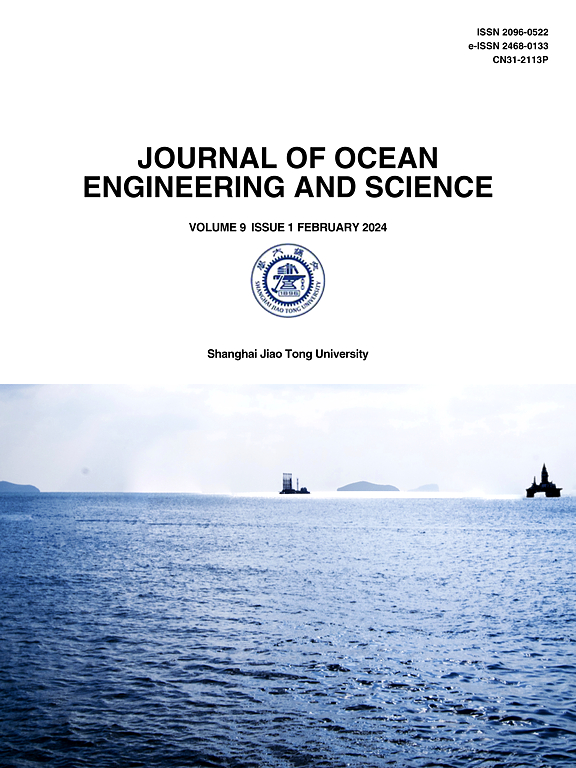基于环境载荷逆重构的深水平台运动预测
IF 11.8
1区 工程技术
Q1 ENGINEERING, MARINE
引用次数: 0
摘要
在混合模型试验技术中,模型试验主要用于验证用于预测全深度系统响应的数值模型。然而,基于势流理论的混合模型测试方法高度依赖数学模型的准确性,难以准确预测流致运动等粘滞效应下的全深响应。为解决这一问题,提出了一种基于截尾模型试验环境荷载逆重构的全深系统运动预测方法,同时考虑了平台上的粘性和非线性效应。为了验证该方法,在首海的半潜式平台上进行了一系列模型试验,使用截断和全深度系泊系统来验证该方法。通过逆重建方法可以准确提取不同环境条件下的环境荷载,包括百年周期纯波、纯流、耦合波、风和流条件。时间历史、统计和功率分布结果表明,在粘性效应明显的情况下,该方法比传统的混合模型试验方法具有更好的性能。本文章由计算机程序翻译,如有差异,请以英文原文为准。
Predicting motions of deepwater platform based on the inverse reconstruction of environmental loads
In hybrid model testing technique, model tests are primarily used to verify numerical models which is used to predict the responses of full-depth systems. However, hybrid model testing method based on potential flow theory highly rely on the accuracy of mathematical model, facing challenges in accurately predicting full-depth responses with viscous effects, such as flow-induced motion. To solve the problem, a method for predicting motions of full-depth system is proposed based on the inverse reconstruction of the environmental loads from the truncated model test, considering viscous and nonlinear effects on platform. To validate the method, a series of model tests were conducted for a semi-submersible platform in head seas using both truncated and full-depth mooring systems to validate the method. The environmental loads could be extracted accurately via the inverse reconstruction method under different environmental conditions, including 100-year-return-period wave-only, current-only, coupled wave, wind, and current conditions. The results of time history, statistics, and power distribution show that the proposed method has better performance than conventional method of hybrid model test in situations where viscous effects are obvious.
求助全文
通过发布文献求助,成功后即可免费获取论文全文。
去求助
来源期刊

Journal of Ocean Engineering and Science
Multiple-
CiteScore
11.50
自引率
19.70%
发文量
224
审稿时长
29 days
期刊介绍:
The Journal of Ocean Engineering and Science (JOES) serves as a platform for disseminating original research and advancements in the realm of ocean engineering and science.
JOES encourages the submission of papers covering various aspects of ocean engineering and science.
 求助内容:
求助内容: 应助结果提醒方式:
应助结果提醒方式:


